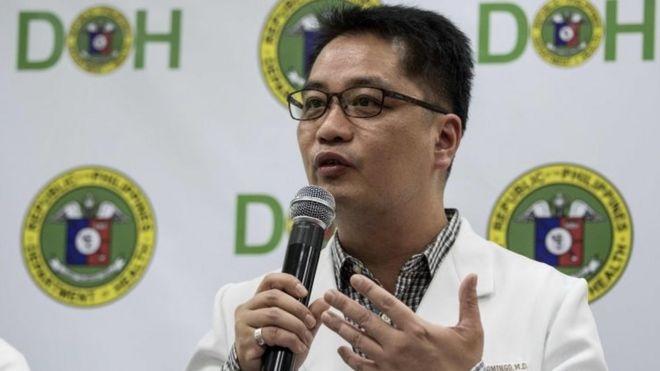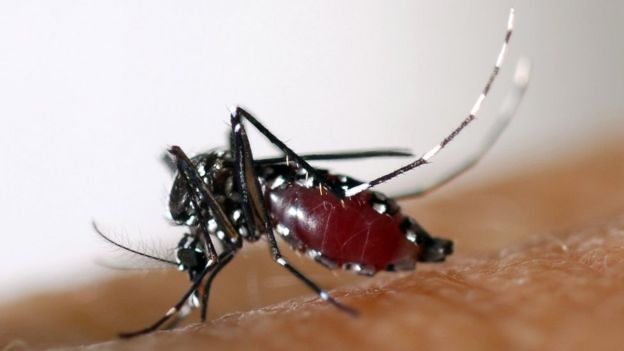A Brief Colonial History Of Ceylon(SriLanka)
Sri Lanka: One Island Two Nations
A Brief Colonial History Of Ceylon(SriLanka)
Sri Lanka: One Island Two Nations
(Full Story)
Search This Blog
Back to 500BC.
==========================
Thiranjala Weerasinghe sj.- One Island Two Nations
?????????????????????????????????????????????????Sunday, February 4, 2018
Philippines gripped by dengue vaccine fears

Enrique Domingo expressed concerns about potential epidemics in the Philippines
2 February 2018
Fears over a dengue vaccine in the Philippines have led to a big drop in
immunisation rates for preventable diseases, officials have warned.
Health Under-Secretary Enrique Domingo said many parents were refusing
to get their children vaccinated for polio, chicken pox and tetanus.
The fears centre on Dengvaxia, a drug developed by French company Sanofi.
Sanofi and local experts say there is no evidence linking the deaths of 14 children to the drug.
However, the company had warned last year that the vaccine could make the disease worse in some people not infected before.
Dengue fever affects more than 400 million people each year around the
world. Dengvaxia is the world's first vaccine against dengue.
The mosquito-borne disease is a leading cause of serious illness and
death among children in some Asian and Latin American countries, according to the World Health Organization (WHO).
What did Mr Domingo say about immunisation rates?
"Our programmes are suffering... (people) are scared of all vaccines now", he warned.
Mr Domingo added that vaccination rates for some preventable diseases
had dropped as much as 60% in recent years - significantly lower that
the nationwide target of 85%.
 Dengue is a potentially deadly mosquito-borne disease
Dengue is a potentially deadly mosquito-borne disease
Mr Domingo expressed concerns about potential epidemics in the
Philippines - a nation of about 100 million people, many of whom are
impoverished.
What triggered fears about Dengvaxia?
More than 800,000 children were vaccinated across the country in 2016-17. Fourteen of them have died.
Dengvaxia immunisations were halted last year, as the Philippines launched an investigation into what caused the deaths.
On Saturday, Doctors for Public Welfare (DPW) said a clinical review
conducted by Philippine General Hospital forensic pathologists had
determined that the deaths were not linked to the vaccine, the
Philippine Daily Inquirer reported.
What about Sanofi's reaction?
In a statement, the French company said: "The University of the
Philippines-Philippine General Hospital expert panel confirmed... that
there is currently no evidence directly linking the Dengvaxia vaccine to
any of the 14 deaths.
"In Dengvaxia clinical trials conducted over more than a decade and the
over one million doses of the vaccine administered, no deaths related to
the vaccine have been reported to us.
"Clinical evidence confirms dengue vaccination in the Philippines will provide a net reduction in dengue disease."
Last November, Sanofi announced that its vaccine could worsen the potentially deadly disease in people not previously infected.
"For those not previously infected by dengue virus, however, the
analysis found that in the longer term, more cases of severe disease
could occur following vaccination upon a subsequent dengue infection," the firm said in a statement.
Sanofi says Dengvaxia has been registered in 19 countries and launched in 11 of them.
In its latest advice on the vaccine, the WHO said that
"until a full review has been conducted, WHO recommends vaccination
only in individuals with a documented past dengue infection".

Recent vaccine controversies:
- 'Anti-vax' movement: activities in the past few years by fringe campaigners against immunisation - particularly for measles - lead to falling immunisation rates in France, Italy and the US
- Polio: Islamist militants in Pakistan have carried out attacks against workers vaccinating children in recent years. The militants say immunisation is a Western campaign to sterilise Pakistani children
- MMR (measles, mumps and rubella): starts with a publication of a 1998 paper falsely linking the vaccine to autism. This leads to a drop in immunisation rates in the UK and the Republic of Ireland.
